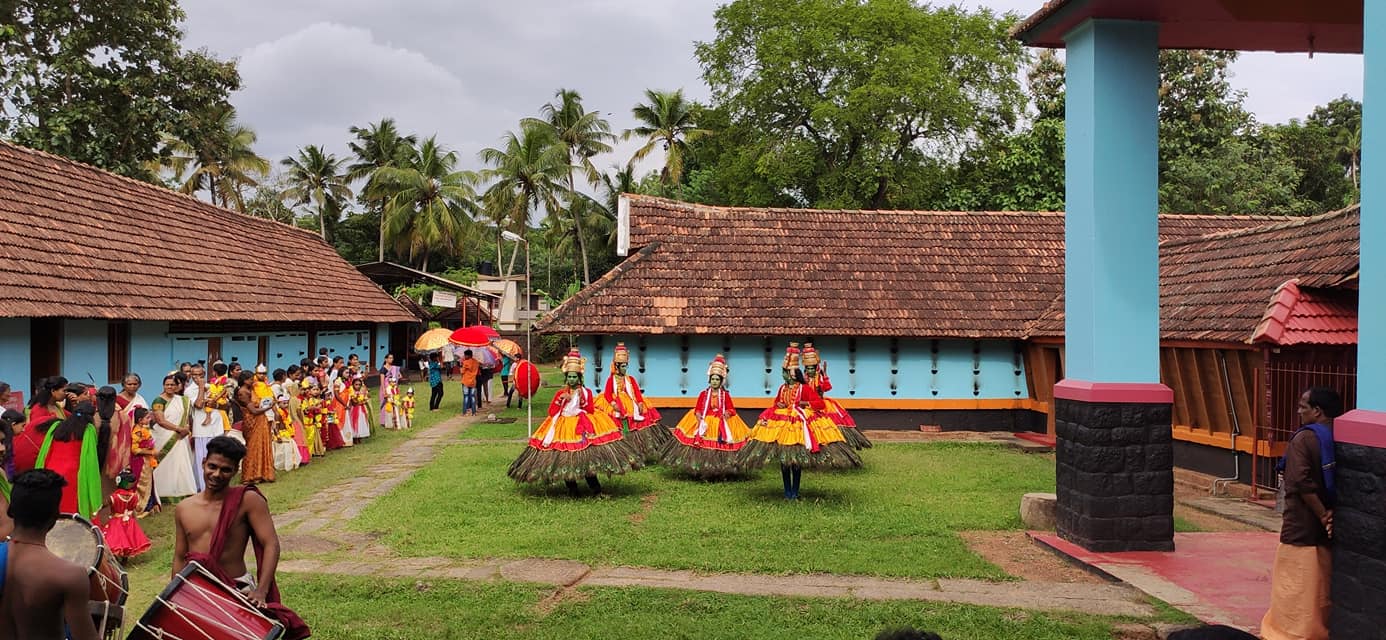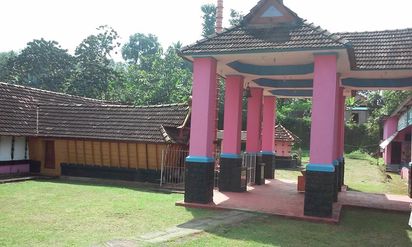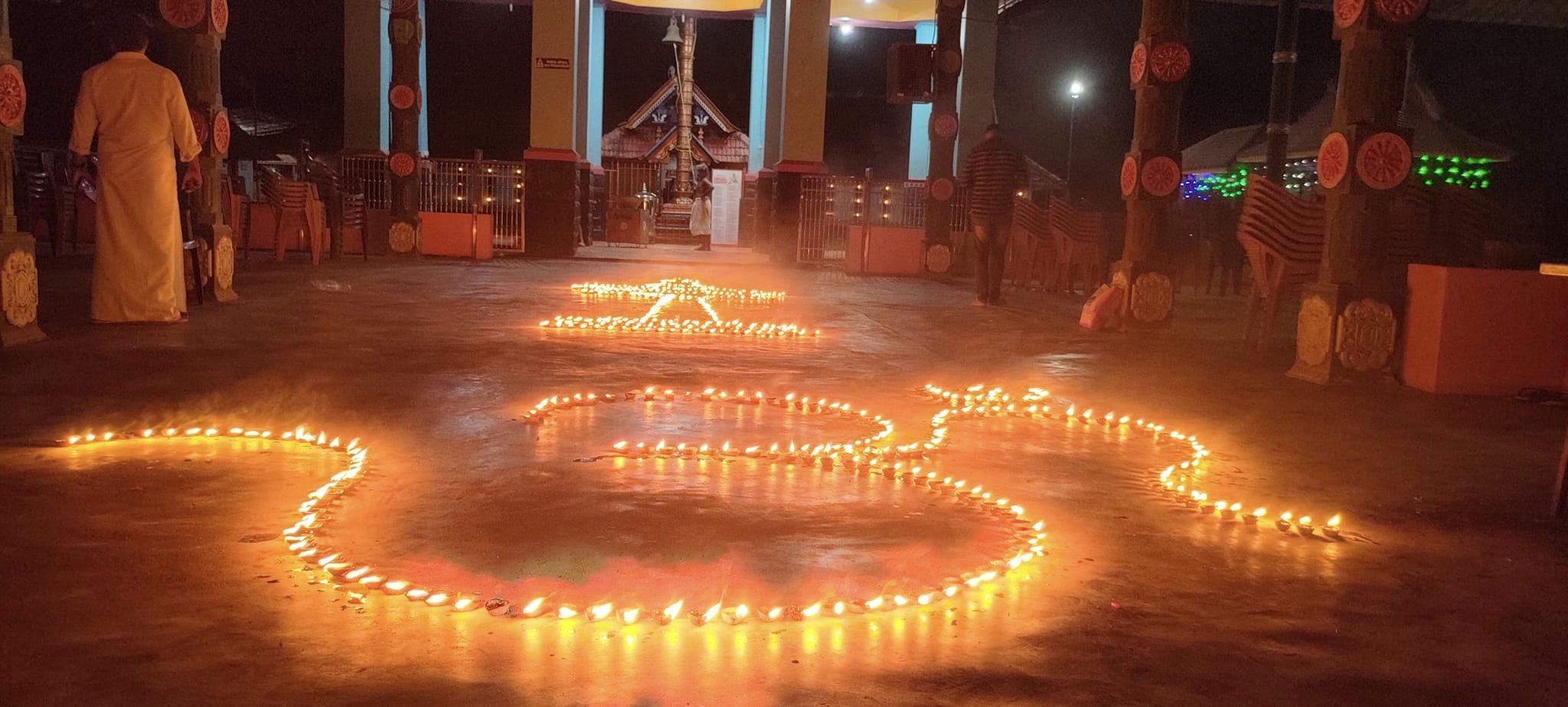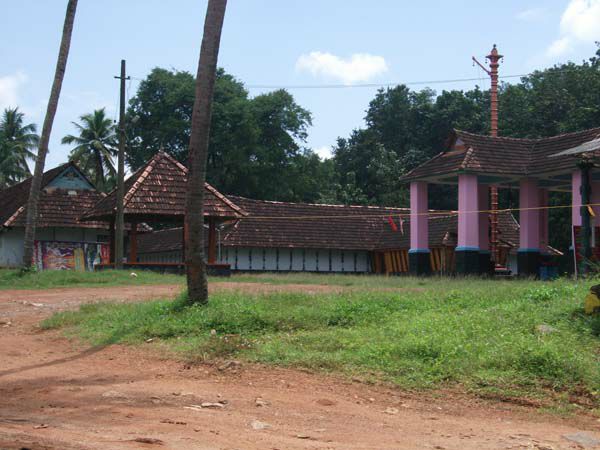Pakalkuri Maha Vishnu Temple (തൃപ്പകൽക്കുറി ശ്രീ മഹാവിഷ്ണു ക്ഷേത്രം) is located along the banks of the Ithikkara River and is one of the rare temples in Kerala that provides Darsanam facing the western direction.

The renowned Pakalkuri Maha Vishnu Temple is situated in the Pallikal Panchayat of the Thiruvananthapuram district, approximately 5 kilometers from Pallickal. This ancient temple, which dates back over fifteen hundred years, is positioned along the banks of the Ithikarayar River. According to legend, it was constructed by King Thithiyan, a fact supported by the stone inscription 'Thithiyanvaka' found beneath the wall of the temple's Balikalpura.
A prominent banyan tree marks the entrance to the temple, while nearby lies the demon floor. To the left of the temple grounds is an old Kalithattu, which serves as a large elephant enclosure, adjacent to the Dhwajasthambham. Close to the Balikallu, one can find a 'Kedavilakku' (an unextinguished lamp). The round-shaped Sreekovil houses the principal deity, Maha Vishnu, who faces west, while the sub-deity, Ganapati, is oriented towards the east. Lord Maha Vishnu is depicted with a conch, chakra, mace, and lotus.
It is believed that the idol worshipped here was consecrated by Bharatha, who established a temple for Sri Rama in Velinallur, located to the west of Pakalkuri. This act is said to explain the westward orientation of the deity. Surrounding the sanctum are intricate sculptures, including dragon faces, lion faces, horses, and Dwarapalakar, all showcasing remarkable artistry. The nalampalam and the outer circumambulation are adorned with scattered rocks. Separate temples dedicated to Shiva and Parvati can be found in the northeast, while Shasta and Naga are located in the west.
Palpayasam and Valsan are the primary offerings, with Valsan being a special offering that is essential during festival days. The Utram Shasta festival in the month of Kumbh is particularly significant, celebrated over a span of ten days. On the sixth and seventh days of the festival, Parayeduppu occurs, involving house-to-house visits. The eighth day features a traditional Ulsavabali, followed by Pallivetta on the ninth day. The festival concludes with the lowering of the flag on the tenth day, culminating in the Aarattu ceremony held in the morning.
പകൽക്കുറി ശ്രീ മഹാവിഷ്ണു ക്ഷേത്രം
തിരുവനന്തപുരം ജില്ലയിൽ പള്ളിക്കൽ പഞ്ചായത്തിലാണ് പ്രശസ്തമായ പകൽക്കുറി മഹാവിഷ്ണു ക്ഷേത്രം സ്ഥിതി ചെയ്യുന്നത്. പള്ളിക്കലിൽ നിന്നും ഏകദേശം 5 കിലോമീറ്റർ ദൂരം കയറി എത്താം. ആയിരത്തി അഞ്ചൂറിലധികം വർഷം പഴക്കമുള്ള ഈ മഹാക്ഷേത്രം ഇത്തിക്കരയാറിൻറെ തീരത്താണ്. തിതിയൻ രാജാവിന്റെ കാലത്ത് പണികഴിപ്പിച്ച ക്ഷേത്രമാണെന്നാണ് ഐതിഹ്യം, ഈ കാര്യത്തിന് തെളിവായി ക്ഷേത്രത്തിന്റെ ബലിക്കൽപുറത്തിന് താഴെ ശിലയിൽ കൊത്തിയിട്ടുള്ള ‘തിതിയൻവക’ എന്ന ശിലാലിഖിതം കാണാവുന്നതാണ്.
ക്ഷേത്രത്തിലേക്ക് കയറുന്നിടത്ത് പടുകൂറ്റൻ ആൽമരം ഉയരുന്നു. സമീപത്ത് ഭൂതത്താൻ തറയും, ക്ഷേത്രപ്പറമ്പിൽ ഇടതുവശത്ത് പഴക്കമുള്ള കളിത്തട്ടും കാണാം. വലിയ ആനപന്തലിനു സമീപം ധ്വജസ്തംഭവും ബലിക്കല്ലിനടുത്ത് കെടാവിളക്കും ഉണ്ട്.
വട്ട ശ്രീകോവിലിൽ, പടിഞ്ഞാറോട്ട് ദർശനമുണ്ടായിരിക്കുമ്പോൾ, പ്രധാന ദേവൻ മഹാവിഷ്ണുവും കിഴക്കോട്ട് ദർശനമുണ്ട് ഉപദേവൻ ഗണപതി. ശംഖ്ചക്ര ഗദാ പത്മധാരിയായ ഭഗവാൻ മഹാവിഷ്ണു, പടിഞ്ഞാറോട്ട് ദർശനവും, കിഴക്കോട്ട് ഗണപതിയുമായി പൊരുത്തപ്പെടുന്നു.
ഭരതൻ ആരാധിച്ച വിഗ്രഹമാണ്, പകൽക്കുറിക്ക് പടിഞ്ഞാറായി വെളിനല്ലൂരിൽ സ്ഥിതിചെയ്യുന്ന ശ്രീരാമക്ഷേത്രം സന്ദർശിക്കാനെത്തിയപ്പോഴാണ് ഈ പ്രതിഷ്ഠ നടത്തിയതെന്നാണ് പറയുന്നത്. ശ്രീകോവിലിനു ചുറ്റും കലാസൗകുമാര്യം നിറഞ്ഞ നിരവധി ശിൽപങ്ങൾ, വ്യാളിമുഖങ്ങൾ, സിംഹമുഖങ്ങൾ, കുതിരകൾ, ദ്വാരപാലകന്മാർ എന്നിവ ആകർഷിക്കുന്നു.
നാലമ്പലത്തിനകത്തും പുറത്തെ പ്രദക്ഷിണ വഴിയിലും പാറകൾ വിരിച്ചിരിക്കുന്നു. വടക്കുകിഴക്കോട്ട് ശിവനും പാർവതിയും, പടിഞ്ഞാറോട്ട് ശാസ്താവും നാഗവും ഉൾപ്പെടുന്ന ഉപദേവതകൾ പ്രത്യേകമായ കോവിലുകളിൽ സ്ഥിതിചെയ്യുന്നു.
പാൽപ്പായസവും വത്സനുമാണ് പ്രധാന വഴിപാടുകൾ. വിശേഷവഴിപാടായി അറിയപ്പെടുന്ന വത്സൻ ഉത്സവദിവസങ്ങളിൽ നിർബന്ധമായും നടത്തണം.
കുംഭമാസത്തിലെ ഉത്രം ശാസ്താവിന് പ്രത്യേകമാണ്; കുംഭമാസത്തിലെ അത്തത്തിന് കൊടിയേറി പത്തുദിവസമാണ് ഉത്സവം. ആറും ഏരും ഉത്സവനാളുകളിൽ വീടുവീടാന്തരമുള്ള പറയുണ്ടാകും. സവിശേഷതയാർന്ന ഉത്സവബലി എട്ടിനാണ്, ഒൻപതാം ഉത്സവത്തിന് പള്ളിവേട്ട, പത്താം ഉത്സവത്തിന് കൊടിയിറങ്ങിയശേഷം രാവിലെ ആറാട്ട് നടക്കും.



